In recent years it’s amazing how popular chickens have become as backyard pets. We’re obviously huge fans of having chickens around the farm. The benefits of having the freshest of eggs in close proximity to the kitchen are obvious, but hens are more than mere egg-laying machines.
We often tout the other benefits of having chickens here, beyond egg laying. However, with the resurgence in chicken keeping, in backyards all across America, we feel it’s important to also be honest about how gardening life really is with poultry on the loose. We see so many magazine articles with blissful, perfect homesteading scenes. Mr. and Mrs. Urban Farmer planting out seedlings, or walking about with pristine perfect produce-filled baskets, with a line of innocent looking hens in tow. Gardening with chickens isn’t all bliss.
So what do you really need to know about having chickens in your garden? First and foremost, you can’t train a chicken. If something looks like food in the garden, it will be sampled, and if it tastes good, they’ll keep going back to it.
Chickens aren’t goats…well, I suppose that’s stating the obvious, but I mean in the sense that they don’t quite mow down every green plant they encounter, but they can be very damaging to gardens. Two or three hens, turned loose in the lettuce patch, can decimate the entire crop.
That said, chickens can be quite discriminating creatures. Our old girls in the orchard aren’t particularly fond of basil, and although they’ll investigate it they usually quickly move on to something else. Our tarragon though, along with the flat leaf parsley and sorrel, is very popular! But I suppose tarragon chicken was inevitable.
The other challenge of gardening with chickens, at least here, is that we often use straw as mulch in some of the garden beds. Mulch is really fun, if you’re a chicken. If you scratch around in it, you’re likely to find some tasty, wiggly morsels lurking beneath. If you’re successful at removing large patches of mulch, on a warm afternoon, the cool damp soil beneath makes for a great place to a take a refreshing dust bath. Did I mention that hens can be very lazy?
Chickens do have their benefits in the garden though.
Chickens are excellent bug catchers. In fact they loved helping us organically control a cabbage looper problem earlier this year. Cabbage loopers apparently are most scrumptious…if you’re a hen.
Generally they’re smart enough to avoid bees, but I have read of chickens standing at the entrance to beehives and picking off numerous bees as they come and go. It’s not common, but if you’re a bee-keeper, that’s something to keep your eye on!
One chore chickens are great at, is green-waste recycling. They love fresh kitchen and garden scraps.
Our girls love it when we’re turning over one of the garden beds, as they’re fairly good tillers and rakers too. They love to help dig over the soil, looking for tasty morsels, and helping with general clean-up.
However, it seems that trowels are somewhat confounding…but then again, what use is a trowel to a chicken?
After snacking on garden bed remainders, this material is then all efficiently processed into…well…to put it delicately, fertilizer.
However, as a gardener you must be aware that chicken waste, although very high in nitrogen, MUST MUST MUST be composted first. Until it’s composted, it can be a lethal substance in the garden, as the excess nitrogen will burn your delicate plants to a crisp.
Small amounts of chicken manure though, added to your regular compost pile, is far superior to any ‘compost booster’ you can buy in a box!
Chickens are also good at aerating your compost piles too. Nothing holds a hen’s attention better than a mound of compost. This is nirvana to a chicken. They’ll scratch around in well stocked compost for hours, digging up tasty high-protein wriggly snacks.
Another chicken chore that’s always in need of attention here at Curbstone Valley is weeding, a task I simply don’t enjoy, and one that the hens are actually quite good at. Well, for five or ten minutes at a time, until they reveal another patch of soil worthy of dust bathing in. I admit, it can be quite challenging keeping our hens on task.
If you have a garden, and you want chickens to be able run around freely, what can you do to protect your plants? Most chickens will take the path of least resistance. If you have raised beds, the simplest thing is to wrap the edge of the beds in a 1 to 2 foot wire barrier, either chicken wire, or hardware cloth.
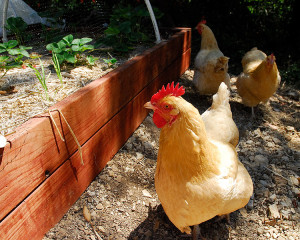
Without netting or row covers over some of our crops, our chickens would eat the lot...especially the strawberries.
Alternatively, you can net over your crops, or use floating row covers. If you plant directly in the ground though, a low perimeter fence or a portable net-like poultry fence may be required to help keep your chickens in strictly designated areas.
Alternatively, you can simply spend time in the garden with your chickens, supervising them. They are actually quite easy to herd. But you have to keep watch, or one will break away, and run straight back to the tomato patch!
Remember though, that in addition to protecting your fruits and vegetables, you also need to protect your chickens. Don’t ever assume that chickens are smart enough to avoid foods that may be toxic to them. As you can see in the video above, one of our hens, Babs, thinks that tomato leaves are tremendously tasty. She doesn’t know that they can potentially harm her. The occasional nibble won’t hurt, but in quantity, they are toxic to chickens. Other toxic plants in your vegetable gardens include potato leaves and peels, rhubarb, and onions.
If you’re going to let your chickens roam freely in your gardens, please remember that they rely on you to keep them safe.

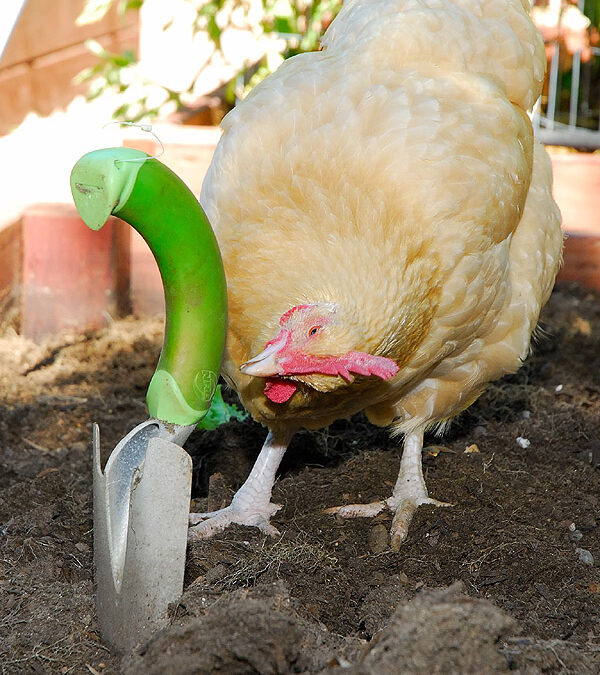
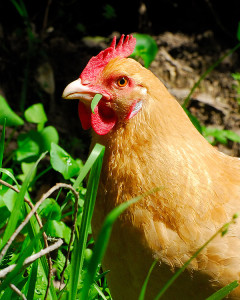
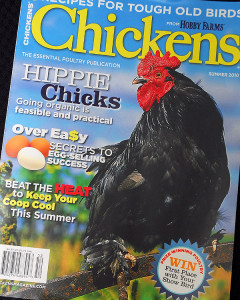
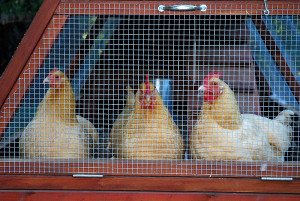
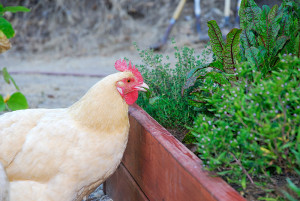
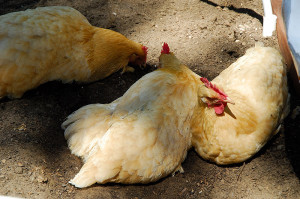
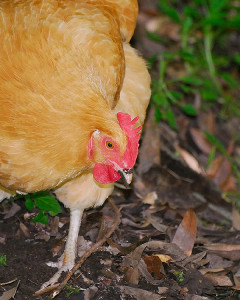
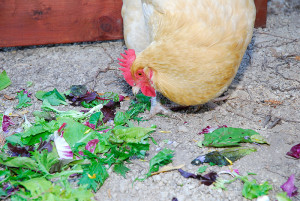
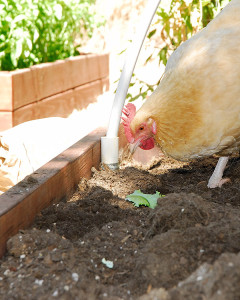
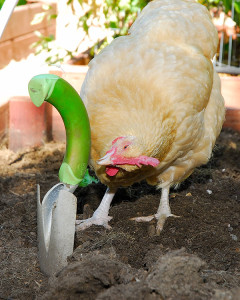
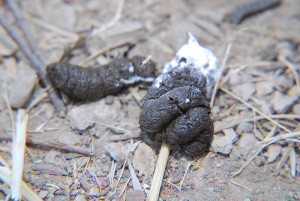
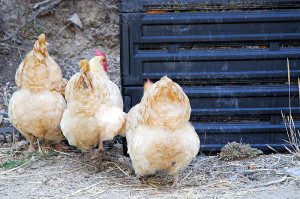
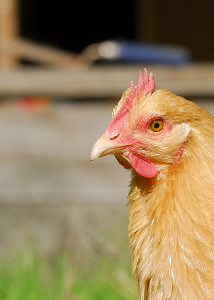


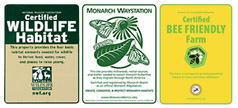




Dear Clare, You are so right to point out the pros and cons of keeping chicken. As you say, for many chicken keeping has become the latest fad but this is not something which should be entered into lightly for anyone’s benefit, and most certainly, for the chicken.
Your posting deserves a wider audience in order that people wishing to keep chicken can be more fully informed and better able to decide if they have the correct conditions and the temperament for keeping chicken both safely and healthily. I have found much, as I always do, of interest in what you have to say.
You’re right Edith. Although it’s not that challenging to raise chickens, it doesn’t suit everyone’s lifestyle. Unfortunately, along with the surge in interest in raising backyard poultry, local animal shelters are also seeing significant increases in abandoned roosters and hens. 🙁
We let our girls loose in garden in the winter when nothing is really growing. The particularly like it when we’re digging in the soil. But yeah, that’s the only time they’re allowed in the garden.
I’m imagining that you have a perfect garden under perfect climatic conditions. I still wish we could have chickens in our backyard. 🙂
Well, definitely not the perfect garden, but it’s coming together. Not quite perfect climatic conditions, at least not this year with our chilly summer, but we are very fortunate to live here. Our gardening year is certainly longer than most!
Very interesting! We don’t have chickens, but if we did, your blog would be a great resource!
Reading your blog is starting to put a bug in my ear that I need a few chickens. Don’t know how zoning is here and really I have my hands full. But I do love chickens. 🙂
Zoning in many urban residential areas at least permit hens, although many restrict the total number of hens per lot. Your local City/County planning offices will have the details…if you decide to venture into raising your own of course 😉
Well, it sounds just a wee bit challenging…If I ever considered chicken, I’d probably start by having rather high raised beds.
Fun watching them, though ;->
The raised beds do help, especially with our larger girls. I am wondering though if we should have made the beds 6″ taller ;P
Enjoyed reading your post.Chicken are really smart animal. My mum gave up growing topioca because the chicken dig the earth to eat the roots.
They are a determined lot those chickens aren’t they?! I particularly love the photo of them eyeing the strawberry patch hopefully and the photo of the chook trying to figure out trowel technology is just priceless! My ducks are a similar pain when it comes to mulch, kicking it around to cover poor little seedlings!
You totally could have taken off running with post…
“…And chickens will make your breakfast for you (sans eggs). Oh, and they love to do laundry!…’
😀
Great post!
If they loved to do laundry…trust me, we’d have many more chickens than we do now! 😛
Great words of advice to those considering chicken rearing! The dust-bath scene makes me think of the sort of damage done by a dog in the garden. Love that photo of the chicken and the trowel. Too cute! All of the photos are beautiful, as usual.
I’m always tempted by chickens, I think in my heart I’m a wannabe farmer. Luckily my cats keep me firmly in check (no other pets allowed they say!). But if I ever was going to seriously consider getting chickens your posts provide an amazing amount of great information.
For some reason I found this sort of hilarious. What a great post!
You really do understand chooks. That was great. But then, do we love despite their faults or because of them?
A bit of both maybe.
This is a wonderful post Clare – I need to retweet this!
Folk need to consider so much if they want to keep chickens and how look after their welfare properly.
I never realised that too many tomato leaves are toxic to them.
My friend planted her containers with spring annuals last year and when she came home from work – the chickens had eaten the lot.
That’s the trouble with chickens, they are more discriminating than goats, but very persistent when they find something they like!
After dealing with the off weather and increase in pests I thought nothing worse could befall my garden so I let the chickens at some of my large grass hoppers only to realize ten minutes later they had uprooted all my newly planted natives! Oh of those eggs weren’t so delicious….
Unfortunately, we can’t just give the chickens a specific list of ‘things to do’. “Please eradicate the cabbage loopers, just don’t eat the lettuce” doesn’t seem to wash with chickens. They prefer their cabbage loopers with a side salad… 😛
Hi, Clare! Fantastic post! I love your girls…so fluffy and curious. I’m glad you discuss protecting them from various plants. People do not realize that MANY plants are extremely toxic, especially to a small creature. I’m quite protective of my Lola (cockatoo) when we’re weeding. She really wants to help, but loves to taste whatever she weeds. It’s usually a challenge!
I love your photos…the facial expressions of your chickens are priceless!
There are many more potentially toxic garden plants than I listed here. One we have to deal with a lot in early summer is vetch. The plants aren’t really the problem, but the seeds are toxic, and the daft chickens love them! Vetch poisoning in poultry is not all that uncommon. Needless to say we’re on a vetch eradication tirade where the chickens roam. It’s just important to know what grows in your garden when you let your birds (chickens or cockatoos!) roam free.
Love that photo of Ginger with the grass hanging out of her mouth! Interesting that they are into tarragon but not basil. No pesto for them, eh? 😉
We love that photo too…we dub it ‘Farmer Chicken’, and actually turned it into note cards for the farm last year. They really love their tarragon, not sure why though, but you’re right, no pesto for them. That’s ok though, more for us 😛
Great post–informative with lots of humor! I want to have chickens but with travel and other projects, I have to wait until at least next year to add them. Do you have favorite books about chickens to which you refer?
I don’t really have many books on chickens here beyond a couple of poultry health texts. I have browsed through a few chicken rearing texts though. The Storey publishing books in most feed stores are alright for beginners, but I actually preferred the Raising Chickens for Dummies book, and isn’t a bad one to just have on hand just for reference. It’s user friendly, and more up to date than some other texts. They also just published a Building Chickens Coops for Dummies too. Patricia Foreman’s “City Chicks” is a fun book as well. I’d recommend checking at your local library to see what they have, especially for the basic chicken raising information. There are as many opinions on raising chickens as there are breeds of fowl, so I think it’s good to check a diverse array of sources, and decide what works best for you.
Okay, so next time I’m visiting the mcmurray hatchery website, shopping cart full of mixed wyandottes and cursor hovering over the checkout button… I’ll remember this post, and go weed something instead. I can enjoy your chickens by watching those fun videos, without the tribulations of having my own flock 😉
What a useful post! Thanks so much — I have been yearning for chickens and it’s good to have the pros and cons so clearly spelled out. But the adorable pictures may push me over the edge!
Chickens, you gotta love them. Even when the veg gardens do get a little hen pecked! Fun post. Thanks!
I love your chicken posts, Clare. They are just chock full of great information, especially for the novice (in my case, wannabe) chicken farmer. I think the most important lesson I’ve learned from you is that raising chickens ain’t no walk in the park, but it’s ultimately extremely rewarding and totally worth the effort. Btw, I’m also considering Guinea fowl for our first foray into raising poultry. Do you have any experience or thoughts on these?
Ahhhh…Guinea Fowl. That’s actually where all this started for us. We moved here, and realized the deer brought lots of hitch-hikers, in the form of ticks. Guinea fowl on range are reported to be the best breed of fowl for consuming ticks, and we needed all the help we could get. However, we changed our mind when we realized how loud the Guinea’s can be, even the females. Their alarm call is much worse than our turkeys. If you really want Guinea’s, see if you can find someone with a flock, and spend a whole morning or afternoon with them. Some of it depends on how close your neighbors are, or how close they’d be to your house, but they can be very loud, especially if you have more than a pair. To be honest, I’d rather listen to a rooster 😛
What a fun post. I love the photo of the chicken and the trowel. Great patrols of your garden. 🙂
I just love your chicken posts. Sure they are informative – but that’s not why I love them: They are simply hilarious. The girls are so funny and I love your videos of them. They are so serious about their peckings and scratchings – maybe that’s why they make me laugh. They are obviously very happy and fulfilled chickens. I also love that you keep a home for retired chickens. I’d have to do that too, if I had chickens.
Our old hens signed up for the full retirement plan. 😛 Now I’m trying to figure out where we can get a deal as good as they have!
Such a fun and informative article, Clare. I can picture you out in the garden with your lazy hens, trying to get them motivated to weed for more than 10 minutes at a time.
Hey, in the heat of August, that’s how I felt, too! 😉
Anyway, you’ve enlarged my picture of chickens and their potential and activities sufficiently to reawaken my chicken lust again. One day!
Clare – what a great post! You are the shaman of chicken ‘handlers’. 😀 Like any animal – you point out that there are many ‘not so glamorous’ /time-intensive daily activities that need to be taken care of…
I love watching chickens dirt bathing… so cute! Yours look svery happy.
What a great post! Thanks for sharing. I love buff orpingtons and could watch them forever if I only didn’t have a million other things to do too.
This is very good information. We seriously looked into getting chickens early this spring until I started doing lots of reading. I didn’t know they would eat plants and seedlings, and thought they mostly would eat the bugs. Your chickens seem lucky to have such a nice safe place to help you garden in. We’ve been lucky that my husband’s coworker brings us eggs from his chickens for us to enjoy.